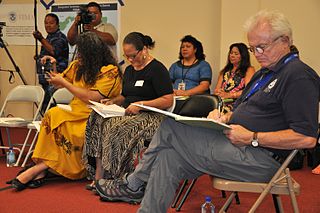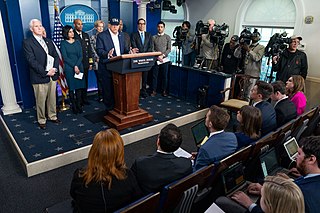Political science is the scientific study of politics. It is a social science dealing with systems of governance and power, and the analysis of political activities, political thought, political behavior, and associated constitutions and laws.

Public relations (PR) is the practice of managing and disseminating information from an individual or an organization to the public in order to influence their perception. Public relations and publicity differ in that PR is controlled internally, whereas publicity is not controlled and contributed by external parties. Public relations may include an organization or individual gaining exposure to their audiences using topics of public interest and news items that do not require direct payment. The exposure is mostly media-based, and this differentiates it from advertising as a form of marketing communications. Public relations aims to create or obtain coverage for clients for free, also known as earned media, rather than paying for marketing or advertising also known as paid media. But in the early 21st century, advertising is also a part of broader PR activities.

In public relations and politics, spin is a form of propaganda, achieved through knowingly providing a biased interpretation of an event or campaigning to influence public opinion about some organization or public figure. While traditional public relations and advertising may manage their presentation of facts, "spin" often implies the use of disingenuous, deceptive, and manipulative tactics.

Edward Louis Bernays was an American pioneer in the field of public relations and propaganda, and referred to in his obituary as "the father of public relations". His best-known campaigns include a 1929 effort to promote female smoking by branding cigarettes as feminist "Torches of Freedom", and his work for the United Fruit Company in the 1950s, connected with the CIA-orchestrated overthrow of the democratically elected Guatemalan government in 1954. He worked for dozens of major American corporations, including Procter & Gamble and General Electric, and for government agencies, politicians, and nonprofit organizations. His uncle was psychoanalyst Sigmund Freud.

Foreign Affairs is an American magazine of international relations and U.S. foreign policy published by the Council on Foreign Relations, a nonprofit, nonpartisan, membership organization and think tank specializing in U.S. foreign policy and international affairs. Founded on 15 September 1922, the print magazine is published every two months, while the website publishes articles daily and anthologies every other month.
Corporate propaganda refers to corporations or government entities that spread specific ideology in order to shape public opinion or perceptions and promote its own interests. The more well known term, propaganda, refers to the spreading of information or ideas by someone who has an interest in changing another persons thoughts or actions. Two important early developers in this field were Harold Lasswell and Edward Bernays. Some scholars refer to propaganda terms such as public relations, marketing, and advertising as Organized Persuasive Communication (OPC). Corporations must learn how to use OPC in order to successfully target and control audiences.

The Council on Foreign Relations (CFR) is an American think tank specializing in U.S. foreign policy and international relations. Founded in 1921, it is an independent and nonpartisan 501(c)(3) nonprofit organization. CFR is based in New York City, with an additional office in Washington, D.C. Its membership has included senior politicians, secretaries of state, CIA directors, bankers, lawyers, professors, corporate directors, CEOs, and prominent media figures.

Foreign policy, also known as external policy, is the set of strategies and actions a state employs in its interactions with other states, unions, and international entities. It encompasses a wide range of objectives, including defense and security, economic benefits, and humanitarian assistance. The formulation of foreign policy is influenced by various factors such as domestic considerations, the behavior of other states, and geopolitical strategies. Historically, the practice of foreign policy has evolved from managing short-term crises to addressing long-term international relations, with diplomatic corps playing a crucial role in its development.
In marketing, publicity is the public visibility or awareness for any product, service, person or organization. It may also refer to the movement of information from its source to the general public, often via the media. The subjects of publicity include people of public recognition, goods and services, organizations, and works of art or entertainment.
Collective bargaining is a process of negotiation between employers and a group of employees aimed at agreements to regulate working salaries, working conditions, benefits, and other aspects of workers' compensation and rights for workers. The interests of the employees are commonly presented by representatives of a trade union to which the employees belong. A collective agreement reached by these negotiations functions as a labour contract between an employer and one or more unions, and typically establishes terms regarding wage scales, working hours, training, health and safety, overtime, grievance mechanisms, and rights to participate in workplace or company affairs. Such agreements can also include 'productivity bargaining' in which workers agree to changes to working practices in return for higher pay or greater job security.

In public relations and communication science, publics are groups of individual people, and the public is the totality of such groupings. This is a different concept to the sociological concept of the Öffentlichkeit or public sphere. The concept of a public has also been defined in political science, psychology, marketing, and advertising. In public relations and communication science, it is one of the more ambiguous concepts in the field. Although it has definitions in the theory of the field that have been formulated from the early 20th century onwards, and suffered more recent years from being blurred, as a result of conflation of the idea of a public with the notions of audience, market segment, community, constituency, and stakeholder.
Impression management is a conscious or subconscious process in which people attempt to influence the perceptions of other people about a person, object or event by regulating and controlling information in social interaction. It was first conceptualized by Erving Goffman in 1959 in The Presentation of Self in Everyday Life, and then was expanded upon in 1967.
Reputation management, originally a public relations term, refers to the influencing, controlling, enhancing, or concealing of an individual's or group's reputation. The growth of the internet and social media led to growth of reputation management companies, with search results as a core part of a client's reputation. Online reputation management, sometimes abbreviated as ORM, focuses on the management of product and service search engine results.

The Public Relations Society of America (PRSA) is a 501(c)(6) not-for-profit organization trade association for public relations professionals. It was founded in 1947 by combining the American Council on Public Relations and the National Association of Public Relations Councils. That year, it held its first annual conference and award ceremony.

Giles Scott-Smith is a Dutch-British academic. He is a professor of transnational relations and new diplomatic history at Leiden University and serves as the dean of Leiden University College The Hague.

After the establishment of diplomatic ties with the Soviet Union after the Cuban Revolution of 1959, Cuba became increasingly dependent on Soviet markets and military aid and was an ally of the Soviet Union during the Cold War. In 1972 Cuba joined the Council for Mutual Economic Assistance (Comecon), an economic organization of states designed to create co-operation among the communist planned economies, which was dominated by its largest economy, the Soviet Union. Moscow kept in regular contact with Havana and shared varying close relations until the end of the Soviet Union in 1991. Cuba then entered an era of serious economic hardship, the Special Period.
The Public Relations Journal is an open-access peer-reviewed, electronic academic journal covering topics having to do with public relations and communication studies. It is published quarterly by the Institute for Public Relations and the Public Relations Society of America. The editor-in-chief is Hilary Fussell Sisco.

The Graduate Institute of International and Development Studies, also known as the Geneva Graduate Institute, is a public-private graduate-level university located in Geneva, Switzerland.
The Fletcher School of Law and Diplomacy is the graduate school of international affairs of Tufts University, in Medford, Massachusetts. Fletcher is one of America's oldest graduate schools of international relations. As of 2017, the student body numbered around 230, of whom 36 percent were international students from 70 countries, and around a quarter were U.S. minorities.

Vietnam–Yugoslavia relations were historical foreign relations between Vietnam and now split-up Socialist Federal Republic of Yugoslavia. Two countries established formal bilateral relations in 1957. Relations were predominantly positive due to positive public image of Vietnam in Yugoslavia which was result of Vietnamese resistance to foreign domination and shared membership in the Non-Aligned Movement.











